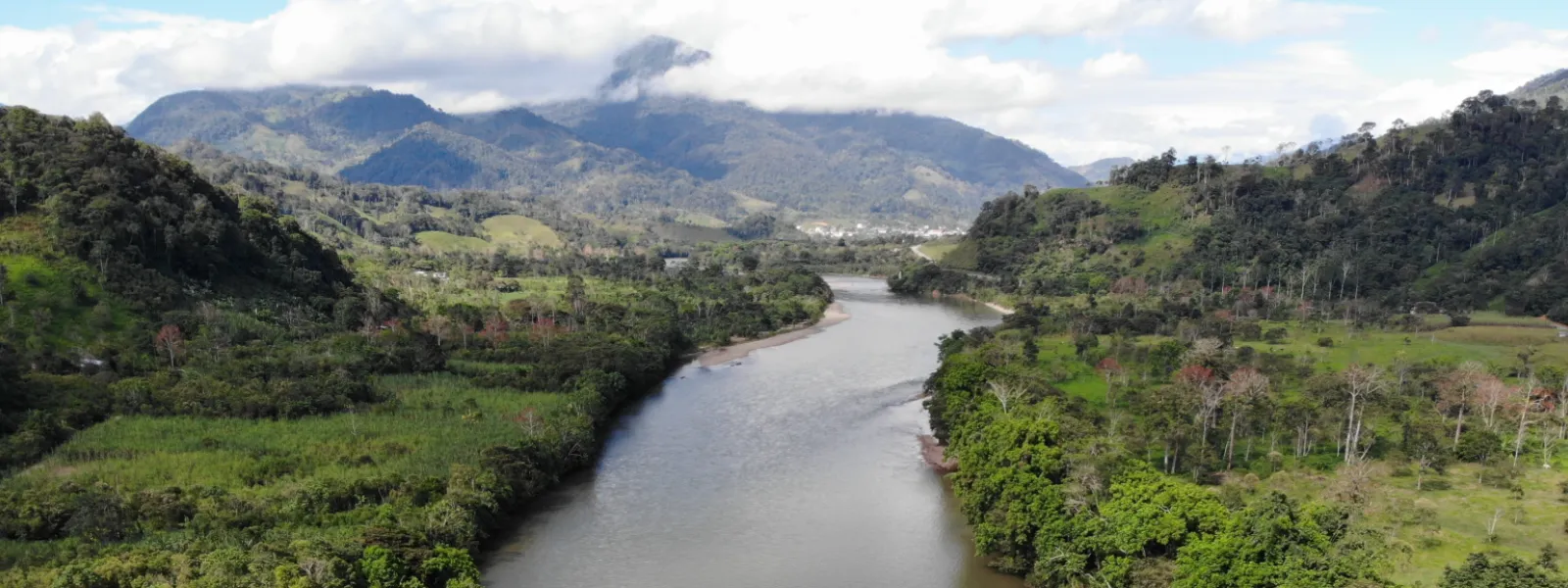
Amazon Summit: 6 proposals for preserving the Amazon through regional cooperation
Photo: Michael Vite on Pixabay.The Amazon is the world's largest tropical forest, a megadiverse ecosystem, and a global climate stabilizer that plays a key role in South America's water cycle. The region is also home to hundreds of indigenous, peasant and local communities.
Despite its richness and cultural importance, the Amazon is threatened by colonization and land grabbing, deforestation, fires and extractive activities, among others.
Because the Amazon is shared by eight countries – Bolivia, Brazil, Colombia, Ecuador, Guyana, Peru, Suriname and Venezuela – and French Guiana, a French overseas department, its conservation requires a regional effort.
The Amazon Cooperation Treaty (ACT), signed in 1978 by the eight Amazonian countries, promotes the sustainable development of the Amazonian territories, with an emphasis on cooperation and scientific research. In 1998, with an amendment to the Treaty, the countries created the Amazon Cooperation Treaty Organization (ACTO) to strengthen and improve the cooperation process.
Today, ACTO is the only socio-environmental bloc in Latin America and the most important scenario for establishing solid regional coordination for the conservation of the Amazon biome. However, this intergovernmental organization has not yet reached its potential. On the one hand, it has encountered obstacles in generating funding, and has had to rely on international sources on several occasions. On the other hand, it has not allowed the effective participation of civil society.
On August 8 and 9, the city of Belém do Pará in Brazil will host the Amazon Summit 2023, the fourth meeting of the Presidents of the States Parties to the ATT. Given the opportunity that this meeting offers to revitalize the ATT for the benefit of the Amazonian territories, we present below six proposals for the conservation of this ecosystem through regional cooperation.
1. Reform ACTO bodies to allow for public participation
There is an urgent need to update the ACT and reinstate ACTO to ensure broad civil society participation, including in the meetings of ACTO's governing bodies and in the drafting of its Strategic Agenda for Amazon Cooperation. The minutes of such meetings should be made public. These and other measures are essential for Amazonian states to fulfill their obligations under the Escazú Agreement, a regional treaty that recognizes the public's right to access information on environmental matters.
2. Promote involvement, dialogue and coordination with Amazonian populations
The indigenous, peasant and local communities that inhabit the Amazon have played a fundamental role in its protection. For millennia, their knowledge has enabled its conservation. Therefore, efforts to conserve this ecosystem must begin by recognizing, valuing and protecting these ancestral knowledge systems, promoting their participation in decision-making, and guaranteeing their rights in accordance with international human rights frameworks.
3. Protecting environmental defenders in the Amazon
Four of the Amazonian countries – Brazil, Colombia, Ecuador and Peru – are among the countries with the highest risks for environmental and territorial defenders, especially indigenous and peasant women defenders. Despite this, ACTO currently has no strategy to address this serious situation. The organization must guarantee environmental defenders a safe and conducive environment for their work, a task that should include a program for the protection of women defenders in the Amazon.
4. Effectively fight the use of mercury in gold mining
The use of mercury in small-scale gold mining is devastating to communities and ecosystems in the Amazon. At the regional level, ACTO should adopt a resolution or program to address this issue directly. And at the international level, member states should act as a bloc to push for amendments to the Minamata Convention on Mercury so that the treaty prohibits the marketing of the heavy metal and its use in small-scale gold mining.
5. Promote compliance with international environmental agreements
Based on a regional strategy for the recognition of international environmental law to protect the Amazon and its people, ACTO should advise States Parties on compliance with environmental treaties such as the Convention on Biological Diversity. It should also assist States in the inclusion of threatened sites, knowledge systems, traditions and cultural expressions of peasant communities and indigenous peoples on lists of priority international attention and support, such as UNESCO Biosphere Reserves and Intangible Cultural Heritage, and Wetlands of International Importance under the Ramsar Convention on Wetlands.
6. Promote a different vision of development for the Amazon
ACTO should promote a vision of development that considers communities and addresses the problems of deforestation, fires and the expansion of the extractive frontier through international integration. It should also articulate regional efforts to stop the expansion of the oil frontier and advocate for the establishment of a moratorium on fossil fuel extraction in the Amazon. In addition, it should promote legal reforms that discourage the expansion of illegal mining and its impacts.
Looking to the future
The Amazon rainforest and the potential for regional cooperation to conserve it are at a critical juncture. The point of no return for the Amazon, the point at which the rate of deforestation nullifies its capacity to regenerate, is no longer a future scenario. But at the same time, after several years of little action within ACTO, this year's Amazon Summit and the reactivation of the Amazon Parliament in 2022 renew hope for regional cooperation to conserve the Amazon.
In the same vein, the presidents of Brazil and Colombia recently announced their goals to reduce illegal deforestation in the Amazon by 2030.
Given the current threats to the Amazon and ACTO's mandate to promote regional cooperation, its member states should seize this moment to provide the organization with more regular and permanent funding. This is necessary to implement effective long-term programs and, in particular, the above-mentioned proposals.
Civil society should also take full advantage of opportunities for advocacy with ACTO and its bodies, including participation in the Amazon Dialogues that will take place from August 4 to 6 as a prelude to the Summit.
Joint regional and transboundary efforts are powerful enough to save a vital ecosystem for the region and the world.
Anna Dell'Amico

Anna Isabella Dell'Amico es estadounidense y fue pasante del Programa de Ecosistemas de AIDA. Es estudiante de la Facultad de Derecho de la Universidad de Nueva York y cuenta con una licenciatura en Ciencias Políticas de la Universidad de California, Berkeley. Tiene experiencia investigando y trabajando en temas de justicia climática, transición energética justa, derecho ambiental internacional, derechos humanos y derechos de la naturaleza.
